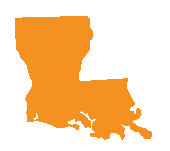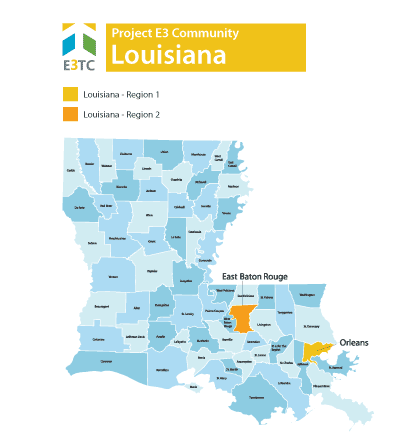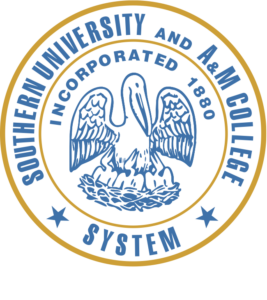Louisiana was chosen as a targeted community through the Vocational Rehabilitation Technical Assistance Center: Targeted Communities (VR-TAC-TC) or Project E3. Project E3 partnered with State VR Agencies and local community partners to improve outreach and employment-related services to underserved people with disabilities in this community.
 Louisiana is known for its rich diversity of people. It has more Native American tribes than any other southern state and is home to the descendants of a variety of settlers, including the French, Spanish, English, German, Acadians, West Indians, Africans, Irish and Italians, and now almost every nationality on earth. There has never been an official language in Louisiana. It is the only state in the U.S. with political subdivisions termed parishes, which are the local government's equivalent to counties.
Louisiana is known for its rich diversity of people. It has more Native American tribes than any other southern state and is home to the descendants of a variety of settlers, including the French, Spanish, English, German, Acadians, West Indians, Africans, Irish and Italians, and now almost every nationality on earth. There has never been an official language in Louisiana. It is the only state in the U.S. with political subdivisions termed parishes, which are the local government's equivalent to counties.
Energy, advanced manufacturing, commercial fishing, chemicals, and agriculture are all vital parts of the state's economy.
Targeted Communities
The state-federal vocational rehabilitation system in Louisiana faced many challenges as it strove to serve people with significant disabilities and promote competitive integrated employment. Project E3 provided intensive technical assistance to two cities in the Louisiana:

Key Information:
New Orleans
Largest city in Louisiana
- Is a major US port
- Known for French and Spanish Creole architecture
- Hosts Mardi Gras and other celebrations and festivals
- Famous for its cuisine and jazz music
Orleans Parish
Devastated by Hurricane Katrina
- Was the largest parish in Louisiana before Hurricane Katrina
- After Hurricane Katrina was the 3rd largest parish
Baton Rouge
Capitol of Louisiana
- Second largest city in Louisiana
- Forms the parish seat of East Baton Rouge Parish
- The Port of Greater Baton Rouge is the tenth largest in the United States
Targeted Populations
Within the targeted communities, Project E3 focused on improving vocational rehabilitation service outcomes for these populations:
These populations were characterized as:
Primary Challenges for Targeted Populations
The combination of the challenges above and other factors created significant barriers for persons with disabilities living in Louisiana, including:
Key Strategies to Address Barriers
Following are some of the key strategies developed and implemented to address the targeted populations' challenges and barriers to employment.
Community Based Participatory Research (CBPR): To understand a community’s issues and concerns, one needs data and information both supplied by common data sources and interpreted by the community to better understand their issues and possible solutions to those issues. CBPR’s methodology is predicated on deep and extensive community involvement in the identification of issues and concerns and in the resolution of those issues and concerns.
Job Club: UpLiftd hosted a job club in Baton Rouge which was switched to virtual Job Club meetings to adapt to the restrictions imposed by the pandemic. According to facilitators, this format appears to work well, though current rates of participation remained relatively low in the virtual setting.
Integrated Resource Teams (IRT): To overcome misunderstandings between agencies serving persons with disabilities especially individuals with HIV and mental illness, IRTs are an excellent way to structure collaborative working arrangements as well as consider options for the blending and braiding of services and funding. As Project E3 was coming to close, Louisiana explored options for training in IRT
Evidence Based Practice Counselor Toolkit: Mental Health First Aid Training - Mental Health First Aid is a skills-based training course that teaches participants about mental health and substance-use issues. It is a helpful tool for educating community members who are not familiar with current research and prevalence of mental illness and substance-use issues. It can help obtain buy-in to other strategies to treating mental illness.
Financial Literacy Training: Supported people to develop skills and knowledge about personal money management and helped them develop a plan for their financial future.
Project Outcomes
Project E3 provided Louisiana’s state Vocational Rehabilitation agencies and their partners with the skills and competencies needed to effectively and efficiently address barriers to competitive integrated employment and community integration encountered by persons with disabilities in these regions.
Our specific goals included:
We will leverage promising practices, knowledge, and experience gained from this project to expand employment opportunities for individuals with disabilities from underserved and economically disadvantaged populations throughout Louisiana and across the United States.
Continuation and Sustainability Plan
Tools and Resources
Financial Literacy Training Tools
National Disability Institute Financial Capability Series
- Module 1: An Introduction to Financial Wellness
- Module 2: Setting Financial Goals
- Module 3: Choosing and Accessing Financial Products
- Module 4: Savings and ABLE (Achieving Better Life Experience) Accounts
- Module 5: The Importance of Good Credit
- Module 6: Using Work Incentives to Meet Financial Goals – Part 1
- Module 7: Using Work Incentives to Meet Financial Goals – Part 2
- Module 8: Protecting Your Identity
More Information
For further information about these community activities contact:

Dr. Madan M. Kundu, Ph.D., FNRCA, CRC, NCC, LRC
Project E3 Project Director
Chair & Professor, Rehabilitation & Disability Studies
Southern University – Baton Rouge
madan_kundu@subr.edu

Susan Flowers, Ph.D., CRC
Project E3 Principal Investigator
Assistant Professor, Rehabilitation & Disability Studies
Southern University – Baton Rouge
susan_flowers@subr.edu


